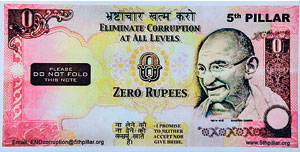NEW DELHI, (AFP) - After decades spent deploring the daily blight of bribery in private, thousands of Indians are taking the anti-graft fight into their own hands and going online to shame the guilty.
India is no stranger to graft, whether it be a billion-dollar corporate fraud case or absurdly inflated toilet paper contracts for the athletes' village at last month's Commonwealth Games in New Delhi.
But corruption is most vividly felt in people's everyday lives, with seemingly endless requests for backhanders to secure everything from phone connections to birth certificates and school admissions letters.
 |
| This handout file photograph taken on February 4, 2010 from the website of the non-governmental organisation 5th Pillar shows the protest note and anti-corruption tool - the zero-rupee note in New Delhi. AFP |
A Bangalore-based non-profit organisation, Janaagraha, responded to the problem in August by setting up a website, IPaidABribe.com (IPAB), a cathartic forum for angry citizens to vent their frustration and share experiences.
In February, a lobby group called 5th Pillar printed and distributed a zero-rupee note, urging people to hand them out whenever they encountered a greedy bureaucrat.
And in the western state of Gujarat, graduate students from the elite Indian Institute of Management-Ahmedabad are setting up a toll-free helpline for citizens faced with official corruption.
Nearly 2,000 people have logged on to the IPAB website so far and their irate anecdotes reveal the depth and breadth of the problem.
One man recalled receiving threats from an official at the income tax department, asking him to pay 30,000 rupees (680 dollars) or risk harassment from the tax authorities.
A restaurant owner wrote about paying 290,000 rupees for a liquor licence. And, perhaps most shocking, a doctor reports on a cardio surgeon at a publicly-funded hospital quietly asking for 10,000 rupees to operate on a patient.
For some, complying with demands for bribes is not only a source of anger, but also one of shame at participating in a system they abhor.
"I felt awful that day," one young woman wrote after paying 3,500 rupees to acquire a driver's licence.
"And yet the driver's licence was important to me. I didn't know how else to get it. I hate to live in India because I am scared I will come across such a situation again and feel helpless about it," she said.
The initiative is run by a retired civil servant, T.R. Raghunandan, who also offers advice online on how to navigate India's labyrinthine bureaucracy without shelling out kickbacks.
And government officials have begun to take notice.
Alarmed by the number of complaints about the issuing of drivers' licences, Karnataka transport commissioner Bhaskar Rao contacted the team behind IPAB and has since issued warnings to several officers working at the regional transport office.
"It's a shameful situation," Rao told AFP. "But I don't entirely blame people who want to hurry things up by paying bribes. Public service delivery is so slow in this country. The systems are so outdated, and the entire infrastructure is backward." The team behind IPAB believes that taking anti-corruption efforts online is a model that government should follow.
"Corruption happens when you have a situation where people can exercise discretion with no accountability," Raghunandan said. "For instance, to file a complaint with the police, it's up to the officer to exercise discretion. Whereas, if you could file a complaint online, you are removing that possibility". IPAB has already made some headway. The Karnataka Electric Transmission Corp. recently contacted Raghunandan about sending accounts personnel to volunteer as public grievance officers online.
The IPAB team is also looking to create mobile phone access and to build a counselling centre where volunteers will help people deal with officials without paying bribes.
Pratyush Sinha, who retired this year as head of the government's main corruption watchdog, the Central Vigilance Commission, said the worst part of his "thankless job" had been observing how the problem had insinuated itself into the very fabric of society.
"When we were growing up I remember if somebody was corrupt, they were generally looked down upon," Sinha said. "There was at least some social stigma attached to it. That is gone. So there is greater social acceptance." Transparency International, the global anti-graft body, puts India 87th on its corruption perception index -- 10 places below China -- with a 3.3-point rating, out of a best possible score of 10.
Ramesh Ramanathan, co-founder of IPAB's parent organisation, Janaagraha, admitted that attempting to eradicate the culture of bribery was a "marathon task," and argued that the only solution was public empowerment.
"In India, we treat democracy as something of a spectator sport, we read about it over our morning coffee.
"This is more visceral," he said of the IPAB website. "It's a chance for people to do something about an issue that affects us every day." |


